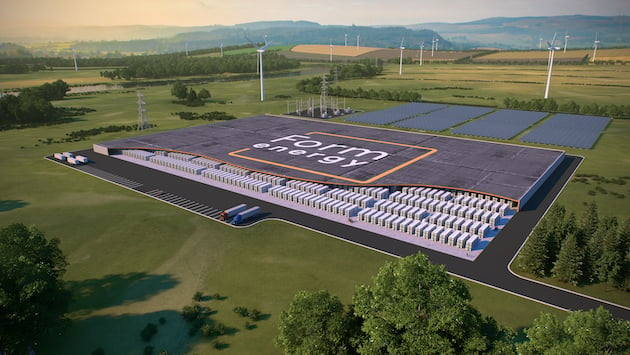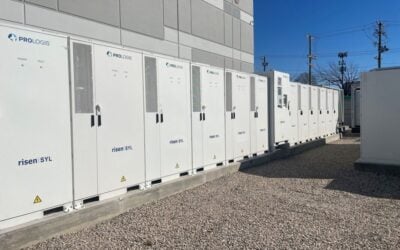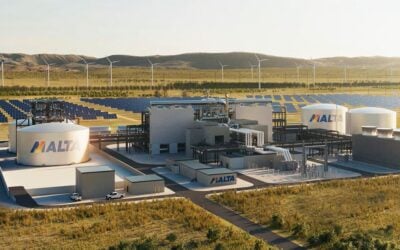
Multi-day battery storage tech startup Form Energy is working with Georgia Power on a potential 15MW/1,500MWh project in the US utility company’s service area.
Form Energy went public last year with the iron-air chemistry of the battery it had been developing for a number of years in stealth mode. The technology essentially causes iron to rust as it discharges energy then converts the rust back to metallic iron as it charges.
Enjoy 12 months of exclusive analysis
- Regular insight and analysis of the industry’s biggest developments
- In-depth interviews with the industry’s leading figures
- Annual digital subscription to the PV Tech Power journal
- Discounts on Solar Media’s portfolio of events, in-person and virtual
The startup has claimed this will offer long-duration energy storage at low-cost, storing and continuously discharging energy for up to 100 hours. If those claims are true, it can be cost competitive with thermal power plants and cheaper than other batteries.
In an interview with this site last year, CEO Mateo Jaramillo, a former director of Tesla Energy, said the rechargeable battery could go after markets that high capacity factor resources, like open cycle gas turbines (OCGT) and coal, currently dominate.
In other words, iron-air could position renewable energy as baseload power for the grid, Jaramillo said. Indeed, before rebranding as Form Energy, the company, spun out of work by noted MIT professor Yet Ming-Chiang, was known as Baseload Renewables.
Yesterday, the company announced its tie-up with Georgia Power, a subsidiary of Southern Company, one of the US’ biggest energy utility holding companies.
Georgia Power and Form Energy are working together to find an optimal application for the 1,500MWh of iron-air battery energy storage systems (BESS) that the technology provider has proposed.
“At Georgia Power, we know that we must make smart investments and embrace new technologies now to continue to prepare for our state’s future energy landscape. As we continue to grow our renewable portfolio, we believe that energy storage solutions will play an important role in ensuring our customers continue to have a reliable and resilient electric grid for decades to come,” Georgia Power’s chairman, president and CEO Chris Womack said.
“We’re very pleased to work with Georgia Power on this important project and to provide a technology solution that will accelerate the transition to a reliable, renewable and affordable electric grid,” Jaramillo said.
“This collaboration is a testament to Georgia Power’s commitment to innovation and economic solutions that are in the best interest of their customers.”
Coal coming offline leaves baseload opportunity for long-duration storage
This is Form Energy’s second announced collaboration with a US utility company. In May 2020, more than a year before the iron-air chemistry had been made public, Energy-Storage.news reported that Minnesota utility Great River Energy had signed up for a pilot deployment of the technology.
The pilot with Great River will be a 1MW/150MWh system. It was announced shortly after the utility said it would replace coal in its energy mix with renewables and energy purchased from the market. That included retiring a 1,151MW coal plant by 2023, the year the pilot with Form is scheduled to get underway.
Georgia Power meanwhile wants to retire over 3,500MW of existing coal-fired generating units by 2028 before closing a remaining two units by 2035. The company is planning to replace that capacity with a mix of natural gas and renewable energy. Its Vogtle Unit 3 and Unit 4 nuclear generation units are scheduled to finally come online after several challenging years of development.
The utility has also begun a build-out of 80MW of battery storage which it will own and operate, and in a recent Integrated Resource Plan (IRP) filed with Georgia’s regulatory Public Service Commission (PSC) requested permission to put a further 1,000MW of BESS into its own and operate portfolio by 2030.
Form Energy’s decision so far to team up with utilities in two regions historically dependent on coal appears to echo its CEO’s assertion in interviews that the iron-air battery’s opportunity is for delivering applications requiring several hours or days of energy, leaving the power intensive, shorter duration applications in the hands of lithium-ion and other technologies.
“While solar, wind, and lithium-ion batteries will meet a good part of future electricity demand, clean, firm resources provide significant cost savings and reliability benefits over a renewables and lithium-ion only approach,” Jaramillo said in his contribution to our Year in Review 2021 blog series last month.
“How to go about providing that clean, firm power and procuring it is starting to come into focus, and we expect this will continue to be the case. We believe that there will need to be cost effective solutions to complement lithium-ion and provide storage over a period of multiple days.”
The company is one of the members of the Long-Duration Energy Storage Council, to which Google and Microsoft recently added their names, and Form Energy was one of the single biggest VC investment dealmakers in the energy storage industry last year, raising US$240 million in a Series D funding round which closed in August. Investors included major steel company ArcelorMittal.






